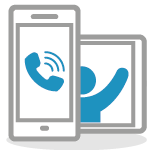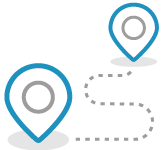If you feel unwell when your GP Surgery is closed, and you cannot wait until the practice reopens, call NHS 24 on 111 who will provide advice and direct you to the appropriate service, if required.
If you think you need to attend the Emergency Department but it’s not life threatening, or if you need to attend a Minor Injuries Unit, call NHS 24 on 111.
Otherwise, if you need general medical advice, visit the NHS Inform website.
Information about your GP service
Further information
What service does your GP provide?
- Advice, information and prescriptions for any medicines you may need
- Routine monitoring and management of ongoing health conditions, such as diabetes, high blood pressure, stroke and heart disease
- Most contraceptive services, minor surgery, maternity services and immunisations
- Screening such as smears and child health
- Referral to another specialist healthcare professional for tests and treatment, if required.
What happens if you have to see your GP and your normal GP surgery is closed?
Because of the current risks posed by COVID-19, unless there is an immediate need for care, your GP Out of Hours service will NOT see you if you turn up unexpectedly.
If you feel unwell, and your GP surgery is closed, call NHS 24 on 111 so they will give you the advice you need. Depending on your symptoms, this may include:
- Advice on managing your symptoms at home
- Asking you to visit your local pharmacy
- Seeing an on-call doctor or other health professional. If you need to see a doctor immediately NHS 24 will arrange this for you.
Consultations
You may receive a telephone consultation with a GP, or a virtual consultation via Attend Anywhere, but, if you need to see a doctor face-to-face, NHS 24 will make an appointment for you at your nearest urgent primary care centre.
Patient transport service
Patient transport service are available to take you to and from the centres if required, and GP home visiting is also in operation if you are unable to travel.
Why are GP practices still working differently?
Here are some of the more frequently asked questions.
How are practices working now?
Most practices are using a “Telephone First” service.
This allows the team to assess you over the phone and consider if you need to be seen in person or if a telephone or video consultation may be more appropriate. This helps to ensure that everyone gets the type of appointment they need, and that you don’t have to travel to the surgery if you don’t need to.
In many cases, your health care issues can be as effectively managed with a telephone consultation as they can with a face to face appointment.
If you need to attend the practice for examination you will be given an appointment.
Why do reception staff ask me personal questions?
GP reception staff are vital members of the practice team and treat all information as confidential.
They ask questions to ensure that you are directed to the best support, within and outwith the practice. They are trained to ensure you are seen by the most appropriate member of the practice team and ensure GPs can prioritise the patients with the greatest clinical need.
Why am I seeing someone who is not my GP?
Many GP practices have teams of specialists working alongside the GPs.
These teams have widened and may include Nurses, Health Care Assistants, Advanced Nurse Practitioners, Pharmacists, Physiotherapists, Mental Health workers and Community Links workers.
Your needs may be dealt with more effectively by one of these team members.
Where else can I get help?
- NHS Inform (www.nhsinform.scot) has lots of information to help you to help yourself
- Your local Community Pharmacist can help you with many common illnesses and can prescribe some medications
- Community Optometrists will give you advise if you have an urgent eye complaint
- Community Dentists will manage your dental problems.



